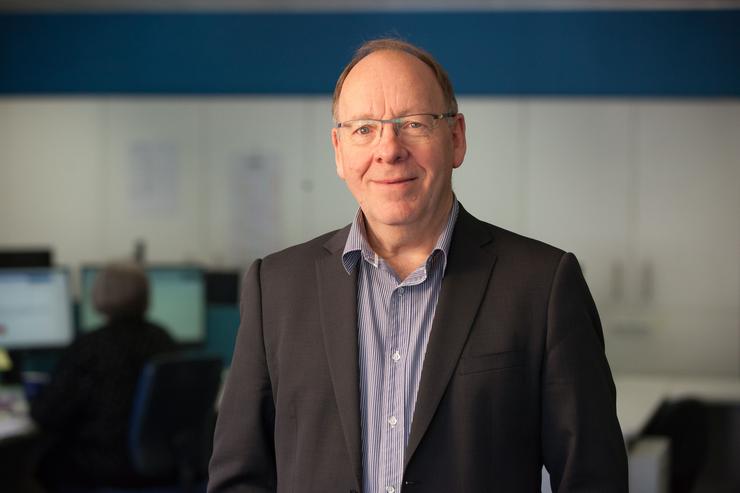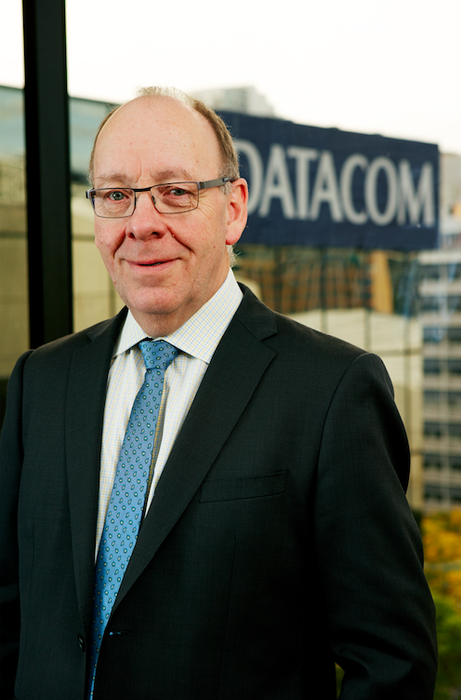
Jonathan Ladd - CEO, Datacom Group
Often asked yet seldom answered, assessing what a customer truly wants from a technology provider remains a complex undertaking for the channel.
New technology triggers new spending habits, and new ways to close deals as informed buyers bargain and sales conversations change.
Yet for Datacom Group CEO, Jonathan Ladd, the answer to solving the customer conundrum is simple.
“People.”
In heading one of Australia and New Zealand’s more progressive systems integrators, Ladd was previously a customer of Datacom before taking the reins, allowing for a deeper understanding of how CIOs operate.
“When I look at what customers are demanding in markets today, it’s not so much any particular type of technology - but an overall cohesive IT strategy based on a solution that works for the customer,” he said.
“They want the best people. They don’t need a single-minded IT salesperson coming in and trying to hedge them into a ready-made box.”
In drawing on a decade of experience as CIO of P&O Cruises internationally, Ladd said partners today must develop a “customer centric focus”, stressing the importance of incorporating an open-minded approach to business.
“Work with all vendors,” he insisted. “Rather than trying to curry favour with a few and compromising what you offer by forcing customers to use X vendor, or Y solution.
“But to pull that off, you need the right staff.”
For Ladd - who stepped into the group CEO role in 2010 - this represents “quite a radical change for the market.”
“Think about the modern market,” he explained. “Sales teams and support staff now need to be able to engage C-Level executives, and other decision makers from outside the traditional IT stream, in business discussions.”
Tech is Business
Based on the notion that every company is now a technology company, delineation is diminishing across industries and verticals, as the definition of a “tech company” changes.
Today, non-technology organisations are applying information technology to serve a customer need, with technology expected to become a central competency for many more companies in the years to come.
Take the Smart Ball designed by Adidas, which incorporates an integrated sensor to translate real-time information to an application designed to help footballers improve kicking techniques.
Or perhaps SenseAware by FedEx, released to provide near-real-time information about a customer’s package as it travels around the world.
Not forgetting Uber of course, which has created a service that powers a marketplace through technology, with the taxi company providing applications to allow customers to participate within this marketplace.
“Technology is now business and business is now technology,” Ladd said. “There isn’t really a separation between the two, and pretty well all customers are realising this. Their business has to be digital in some way.”

Illustrating this shift, the share of worldwide corporate IT spending that is funded by non-IT business units is forecast to reach 47 per cent in 2019, an increase of more than three per cent over 2015.
As reported by analyst firm IDC, 3rd Platform technologies such as cloud, mobility, big data, and social business have created the underpinnings for business process transformation and, in some cases, business model transformation.
With such high stakes, the line of business units are increasingly taking a front seat in technology initiatives by flexing their budgetary muscle, asking questions of whether the CIO still represents the pinnacle of the sales call cycle.
“Ten years ago, we might’ve been trying to close a deal with a CTO, or an IT manager lower down in the chain,” Ladd said.
“Now we’re sitting in meetings with CEOs, CFOs, CMOs, CDOs, sales GMs – it requires a completely new way of doing business.”
Skills
Consequently, as digital transformation takes shape across the Australia and New Zealand enterprises, technology providers must pivot alongside, upgrading skills and processes to meet new buyer expectations.
Traditionally, sales dictated the flow of information through cold calling, sending out corporate marketing literature, meeting with prospective customers and conducting countless sales presentations.
In 2016 and beyond however, the sales force of the future needs to intimately understand the customers' environment with a greater sense of the decision levers across IT and the business units.
Within this, they will also need to translate technology into industry solutions and value propositions, and guide the customers to use cases they may not have considered.
“They don’t want to hear acronyms and high-level tech talk tied to long term CAPEX deals with single vendor solutions,” Ladd said. “They want answers to business problems. They very much have a strong ‘BS radar’ these days, and are wary of being tied to long term, lock-in contracts.”
Translating into a “two-speed response”, Ladd said decision-makers in a digital world seek technical know-how coupled with a track record of delivery, paired with “massive agility”.
“Teams that can concurrently turn on a dime while they find ways to use the benefits of the newest technologies to solve complex problems,” he added. “Often too these new teams are diverse - including designers and a range of varied skills and thinkers.”
Informed Buyers
With research and reviews only a click away, customers have become comfortable making decisions based on widely available information, with little time or desire to listen to a sales or marketing pitch.
In this new era of sales, customer knowledge reigns supreme.
Consequently, Ladd said Datacom is now being approached by informed buyer - both existing and new - looking for specific solutions to specific business problems.
“This is rather than us having to ‘pitch’ them,” he explained. “They come to us and know what they want - a particular mobile app deployment, or integrated system, or hardware.
“That’s fine too. But the customer is far more on to it than they used to be. They’re far more tech-literate than even a few years ago, it’s a generational change.”
With a sea of information now available to customers, in the majority of instances, Ladd acknowledges that the buying process can now take place before there is any real engagement with a sales representative.
As a result, he believes the IT industry as a whole is being challenged to find those “special deal closers”, as buyers switch off to the traditional techniques of the salesperson.
“We’re looking for those sales teams that are tech savvy enough to build functionality, but business savvy enough to explain how what we’re selling will benefit their business, and benefit their own customers too,” he explained.

“Because that is, after all, why we’re in this game.”
Bright Minds
Yet despite the direction of travel being clear, Ladd said the industry remains crammed with channel partners reverting to age-old methods, coldly executing agreements without a long-term strategy or goal.
“Too many IT providers have that ‘sell and forget’ sales mentality,” he said. “Sales teams now have to manage ongoing OPEX deals, which require large amounts of attention and care, over longer terms.
“If you stuff it up, customers can leave you at month end. Your relationship building is just as vital as your technical skill sets and business acumen.”
Alluding again to the difficulty of sourcing such skills, Ladd accepts “everyone in the industry is struggling with it”.
“We’ve been very lucky,” he added. “We have some exceptional minds throughout our business, experts in things like hybrid cloud, next generation security, and emerging technologies such as 3D printing and the Internet of Things.
“Bright minds need complex problems to solve and that's what our customer base is presenting us - especially as all businesses and sectors are facing accelerated rates of change. This deep technical know-how paired with agility is vital.”
As the future of IT sales emerges, technology and service providers are facing a different kind of disruption - one that impacts the way they engage with and sell to buyers.
Some call it the outcome economy, and the concept of translating technical complexities into real-life business case scenarios for customers.
“These new teams continue to amaze me,” he added. “They can not only go into these high level meetings with CEOs and explain Amazon EC1, Azure PaaS and complex mobile app development - but show, rather than tell, ‘normal’ business people how it will work for them and better their business, while bringing them along with their vision.”
According to Ladd, such an approach first and foremost builds trust, reputation and ongoing working relationships.
“That is pretty much how all our new, emerging and niche businesses evolved,” he explained.
“Diverse, creative teams going in to make the traditional business sales, but then demonstrating the value add through innovative new technology, industry challenging ideas, and then backing it up with action.”
In heading a company with over 50 years of experience in serving the end-user, Ladd believes the digital transformation of today’s organisations is akin to their predecessors factoring electricity into formerly steam-driven processes and business strategies 100 years ago.
Simply put, it requires new ways of thinking about how organisations, industries and markets operate, or could operate, in a world where technology-based change is disruptive, constant and accelerating.
Through new ways of thinking, Datacom recently leaped into augmented reality with the first Microsoft HoloLens practice on both sides of the Tasman, following the launch of its national network of data centres – spanning nine facilities across Queensland, New South Wales, Victoria, South Australia and West Australia.
“When you explain to a customer how an augmented reality app is beneficial to a car company in the right terms, how 3D printing can benefit a school’s STEM curriculum, how an Internet of Things solution can help mining companies find gas deposits, how big data analytics can help councils organise traffic and parking, how artificial intelligence can provide a better customer experience as part of a contact centre – then you can fundamentally add sustainable value to a customer’s business that they had never even considered,” he explained.
Those are the people Datacom searches for, that is the talent developed in-house, and that’s where Ladd sees the market going.
“It follows the brightest minds, and we’re hunting them.”
This article originally appeared in the September issue of ARN magazine - to subscribe, please click here




